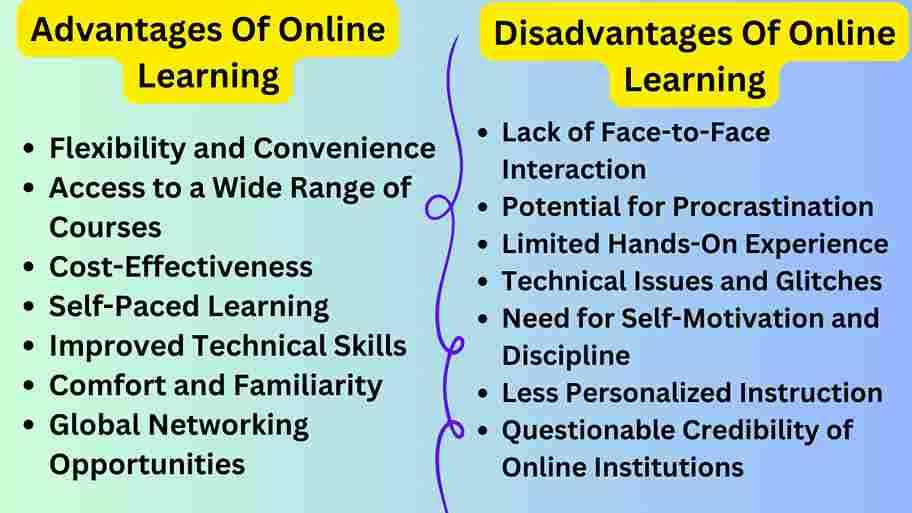Advantages And Disadvantages Of Online Learning
Online learning has transformed education. It offers advantages such as flexibility, access to diverse courses, and cost-effectiveness. However, it also comes with challenges like limited face-to-face interaction and the need for self-motivation. Ultimately, the suitability of online learning depends on individual learning preferences and goals.
Advantages of Online Learning

Flexibility and Convenience
One of the most significant advantages of online learning is its flexibility and convenience. Learners have the freedom to create their study schedules, allowing them to balance education with work, family, or other commitments. This flexibility eliminates the need for commuting to physical classrooms, saving time and resources.
Access to a Wide Range of Courses
Online learning provides access to a diverse range of courses and programs from institutions worldwide. Students can enroll in specialized courses that may not be available in their local area, opening up opportunities for unique skill development and knowledge acquisition.
Cost-Effectiveness
Compared to traditional education, online learning can be more cost-effective. It eliminates expenses related to commuting, textbooks, and accommodation. Additionally, many online courses offer affordable tuition fees, making education more accessible to a broader audience.
Self-Paced Learning
In the online learning environment, students can progress at their own pace. This self-paced learning allows individuals to spend more time on challenging topics while breezing through familiar subjects. It caters to diverse learning styles, ensuring a better understanding of the course material.
Comfort and Familiarity
Online learning takes place in a comfortable and familiar environment, typically the learner’s home or a place of their choosing. This setting can enhance the learning experience, leading to better retention and understanding of the material.
Improved Technical Skills
Engaging in online learning naturally develops technical skills. Learners become proficient in using various digital tools, software, and online platforms. These tech-savvy skills are valuable in today’s digital age and can be beneficial in both personal and professional life.
Global Networking Opportunities
Online learning connects individuals from different parts of the world. Students have the chance to interact with peers and instructors from diverse cultural backgrounds, fostering global networking opportunities and enriching their understanding of various perspectives.
Disadvantages of Online Learning
Lack of Face-to-Face Interaction
One of the primary drawbacks of online learning is the lack of face-to-face interaction with instructors and peers. The absence of in-person communication can lead to feelings of isolation and may hinder the development of essential social skills.
Potential for Procrastination
Online learning requires a high level of self-discipline. Without a structured classroom environment, some students may procrastinate, leading to delays in completing assignments and coursework.
Limited Hands-On Experience
Certain fields of study, such as laboratory-based sciences or hands-on training, may not be fully achievable through online learning. The lack of practical experience can limit the depth of understanding in these subjects.
Technical Issues and Glitches
Reliance on technology can be challenging, especially when technical issues or glitches arise. Internet connectivity problems or platform malfunctions can disrupt the learning process and cause frustration.
Need for Self-Motivation and Discipline
Succeeding in online learning demands self-motivation and discipline. Without a physical classroom and regular face-to-face interactions, learners must stay focused and committed to completing their studies.
Less Personalized Instruction
In online learning, individualized attention from instructors may be limited. Students might miss the immediate feedback and support available in traditional classroom settings.
Questionable Credibility of Online Institutions
While there are reputable online institutions, some may lack the same level of accreditation or credibility as traditional educational establishments. Learners need to research and select recognized institutions to ensure the value of their education.



Leave a Reply